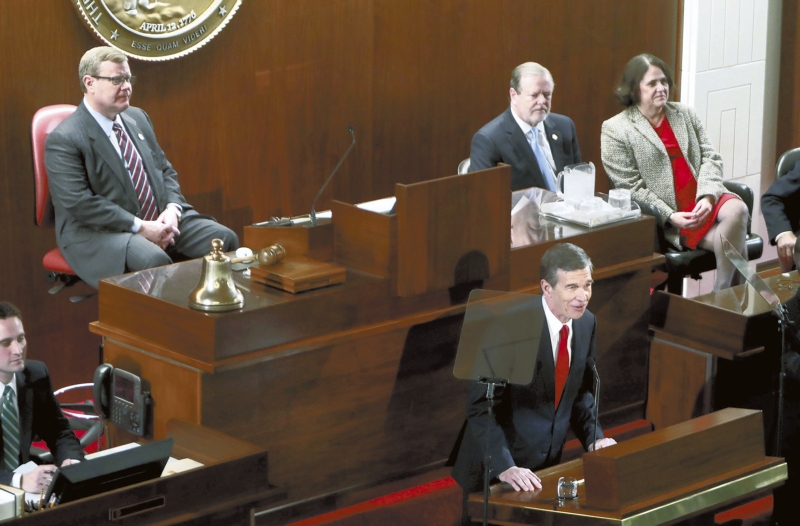Ferrel Guillory: Constitutional propositions raise stakes for education
Published 12:00 am Sunday, July 15, 2018

- North Carolina Gov. Roy Cooper, front right, delivers his first State of the State address to a joint session of the state legislature in the House chamber of the Legislative Building in Raleigh on March 13, 2017. Speaker of the House Tim Moore, top left, and Sen. Phil Berger, president pro tem, second from top right, look on. (Chris Seward/The News & Observer via AP)
The General Assembly deepened the gravity of the off-year election by adding a cluster of six proposed constitutional amendments to the 2018 statewide ballot. None have schools as an explicit subject matter, but two measures, if adopted, would weigh heavily on the future of public education from pre-K through universities.
Even without a race for governor, the election has already developed into an intense contest, with Democrats competing in all legislative districts in an effort to shatter the veto-proof majority held by Republicans. In addition to basic politics, the Republican majority has put serious issues of policy and power before North Carolina voters.
One amendment would make it more difficult in the future for the governor and lawmakers to design tax policy to meet the needs of North Carolina students. It would limit the income tax rate to 7 percent, down from 10 percent, as the Constitution now is written.
Next year, the individual income tax rate will fall to 5.25 percent, the latest in a series of reductions since 2013. Then, the Republican majority enacted a one-rate income tax, shifting away from a long-standing staggered structure that imposed a modestly higher rate on higher income citizens.
No one, of course, envisions a return to a 7 percent top rate – or even 10 percent – in the near term. But a Constitution is – or should be – an instrument for the long term. In part, that is why the Constitution requires approval by three-fifths of legislators and a majority vote of the people.
Tax policy is better suited for legislation adopted to address needs that arise and economic conditions that fluctuate over years. North Carolina still has before it an extensive array of educational challenges: expanding pre-K, bolstering reading by the third grade, closing achievement gaps, treating pre-K-12 teachers as professionals, preparing more adults with post-secondary degrees and certifications for productive careers, and attracting superior scholars. Money is not the only response, but insufficient funding will make it more difficult for the state to meet its constitutional obligations to its own citizens.
To limit tax rates in the Constitution puts power in the hands of a legislative minority. Two-fifths of legislators could block a governor and a majority of lawmakers from responding to education needs and fiscal conditions in the years ahead.
What’s more, a cap on the state income tax would make the state more dependent for revenues on a surging economy unlikely to be sustained over many years. Short of raging growth, a limit on personal and corporate income taxes would shift the burden of supporting education to state and local sales taxes, to the local property tax, to parents who pay tuition, and to private and corporate philanthropy.
The governmental power issue is embedded in a rather extensive proposed amendment that begins with the establishment of an ethics-and-elections board. The measure would also shift from the governor to the legislature control over state government’s hundreds of boards and commissions, including the education-related.
This amendment arose in the context of the ongoing struggle between Democratic Gov. Roy Cooper and the Republican super-majority led by Senate President Pro Tem Phil Berger and House Speaker Tim Moore. But as a constitutional amendment, the measure goes beyond today’s GOP versus Cooper rivalry.
Rooted deep in its history, North Carolina has had a relatively weak governor in formal powers and a rather robust governorship in the informal powers of persuasion and political leadership. Under both Democrats and Republicans, North Carolinians have looked to their governor, as the principal office-holder elected statewide, to articulate and initiate an education agenda.
Governors, to be sure, have to come to the legislature – an assembly of elected representatives of the people in districts of varying interests – to adopt educational policy and appropriations. Deliberating and negotiating among themselves and with the executive is important work in a state that devotes 55 percent of its general fund to supporting schools, community colleges and universities.
In truth, North Carolina needs both a strong legislature and a strong governor – strong not only in formal powers but also in decision-making based on sound research and knowledge of economic and social trends, as well as attuned to the lives of citizens. Inevitably, a strong legislature and a strong governor will clash over ideas, interests and priorities.
But robust debate and consensus-building can move the state forward. A weakened governor’s office, in the long run, would mark a dramatic turn away from North Carolina’s heritage of a governor as principal education agenda-setter.
Guillory is director of the Program on Public Life, professor of the Practice at the UNC School of Media and Journalism and the vice chairman of EducationNC.

